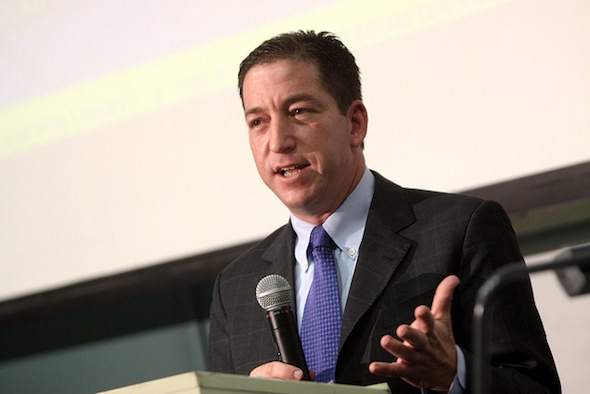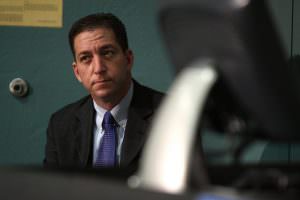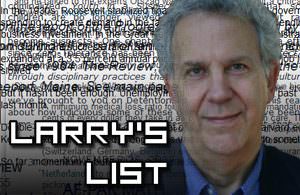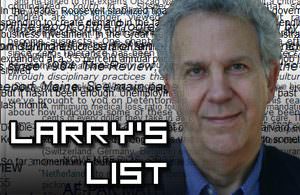Some Important Questions About Greenwald’s First Look Media
Z Magazine co-founder Michael Albert wants to call attention to concerns that are being overlooked in the excitement over Guardian alum Glenn Greenwald and eBay founder Pierre Omidyar's new reporting operation.
Z Magazine co-founder Michael Albert wants to call attention to concerns that are being overlooked in the excitement over Guardian alum Glenn Greenwald and eBay founder Pierre Omidyar’s new reporting operation.
In an article that is conspicuously respectful of Greenwald and Omidyar’s stated objectives, Albert writes on New Left Project and ZNET that he set out some months ago to have a “constructive discussion [with Greenwald] about journalism and the First Look project.” Greenwald and others committed to the integrity of new, promising press ventures should applaud and welcome Albert’s initiative, given that Greenwald wrote a number of articles mercilessly critiquing Al-Jazeera less than a year ago as it began to open reporting bureaus inside the United States.
As Albert expected, Greenwald confirmed his well-established concern for what Albert described as the “coercive possibilities of capitalist owners or the state curtailing adversarial journalism from above.” But Albert wanted to go deeper than the intentions of individuals and their promises to keep them. With a sociologist’s awareness of the conformity-generating nature of institutions, Albert wanted to talk about the commonly unwilled, difficult-to-see and often undiscussed “dynamics that typically generate non-adversarial journalism,” and what Greenwald planned to do to avoid them. He found “some of [Greenwald’s] interview answers… troubling.”
What precisely were Albert’s concerns? For starters, he explains, publishers, even those like Omidyar who have honorably pledged not to impose restraints on writers, “rarely issue coercive commands. More often, reporters censor themselves, which they describe as freely doing whatever they please. That is, reporters spontaneously self impose limits partly due to their mainstream training and partly due to wanting to endear themselves, without being forced to do so, to owners who are their source of income and tenure. And perhaps the most effective censoring dynamic is the most subtle one. A writer who operates in a hierarchical, class-stratified institution, typically rationalizes his or her subordination as arising from the inevitability of such a structure. Soon the structure’s values become second nature to the writer. Derivatively, the writer never journalistically questions those values.”
“This type of journalistic conformism may have eluded Greenwald’s view of [First Look Media’s publication] Intercept,” Albert writes.
Albert’s second concern was about the impact that First Look Media could have on the broader community of alternative journalism, namely the underfunded publishing houses that support it.
“For example,” Albert writes, “suppose First Look and Intercept hire a team of progressive journalists, who thereafter no longer write for other outlets where they were previously employed. Also suppose Greenwald’s prognosis of no restraints pans out perfectly so the many writers Intercept hires enjoy a welcoming environment for their work. So far, so good; but would that mean these writers would generate more and better output than if they were, instead, still employed at various other venues such as the Guardian or Rolling Stone? And would it mean their work would get as wide visibility as if their articles had appeared in those other venues first? Which gets more visibility, a Greenwald article that appears on Intercept or a Greenwald article that appears in the Guardian? What about Taibbi writing in Rolling Stone or at First Look? Will the synergy of bringing many folks into one venue even with a supportive owner outweigh the losses of their leaving other venues?”
“Greenwald presumably thinks the new project will enhance output, quality, and visibility, but is that certain?” Albert continues. “By putting lots of folks under one organizational roof so there is one main vehicle for the public to view their work, couldn’t the number of people seeing the writers’ work decline? Could the total amount of work they collectively generate decline? The verdict is still out on all that, but after many months, there is missing content at other outlets, and its absence isn’t matched by new content at First Look and Intercept, much less matched in outreach.”
Albert’s third concern is that down the line, Greenwald and Omidyar’s project could be so successful that, as “a free source with abundant content,” readers may feel less of a need to financially support or even visit “old familiar progressive media sources.”
“If so,” Albert writes, “and if we take into account the possibility of the larger outfit in a year or two or five drifting away from being adversarial and toward conforming. Then we would have one media outfit instead of many, and the one would be less good than any of the many.”
“We all understand that a massive commercial store can bankrupt many smaller operations with which it partially overlaps but which in sum deliver all kinds of additional and different material,” Albert continues. “Witness the demise of local bookstores. But somehow we don’t get that a big new media operation might have the same effect on many smaller media operations, including not replacing their contributions and thereby fostering a considerable loss. Of course none of this is inevitable, but its likelihood climbs dramatically if no one does anything explicit to avert the outcome.”
In response to Greenwald’s indication that he was sensitive to these concerns, Albert offered three preliminary ways they might be addressed. The first involved taking the financial pressure off alternative sites by having Greenwald’s site feature an opinion section that pays good fees to independent writers who would be allowed to maintain their presence and the presence of their work on those sites. The second involved First Look Media generously paying a range of alternative sites for the right to republish their material. The third involved turning the site into a kind of charity that could give grants to alternative sites.
Albert writes that Greenwald said the two would discuss these options once certain housekeeping duties around First Look were taken care of. “But after that promising beginning, and despite repeated inquiries and reminders, as ensuing months passed, such talks did not happen,” Albert writes.
Albert understands that Greenwald is very busy and wants to continue focusing on his journalism. But he is troubled that no serious discussion about these matters appears to have taken place between First Look Media and the public it aims to serve.
Added to this unsettling silence was the decision to hire John Cook, formerly editor-in-chief of Gawker. Albert is disturbed by Cook’s hire as Gawker seemed to him “like a kind of left gossip site.” Albert fears that “Omidyar’s hiring Cook meant that Omidyar was thinking about revenues and how to bulk up audience by any means rather than only by socially-responsible means. That is, rather than having 60 or 100” well-paid pieces each month, Omidyar “would run gossipy and otherwise socially-questionable but audience-gaining content. Did Omidyar like Cook’s track record in that respect?”
Finally, Albert wonders, if Greenwald and Omidyar are committed to a policy of zero interference with their writers, why would they have an editor in chief at all? Regarding the position’s duties, “does an Editor in Chief assess article content, case by case, while also being able to hire and fire writers? Or are the Editor in Chief’s tasks more in line with adversarial journalism … such as merely seeking to avoid redundancy, or to avoid plagiarism, while also urging (but not forcing) attention to what he sees as important issues? But if the Editor in Chief tasks are only desirable ones, couldn’t they be handled by a workers council of writers instead of an elevated individual?”
“Ultimately,” Albert wonders, “is the designation ‘Editor in Chief’ a sign of adopting a classist internal hierarchy barely distinguishable from mainstream media structure and its related logic, or is it merely a benign but poor choice of a misleading label?” Greenwald urged Albert to talk to Cook. But Cook told Albert there was nothing important to discuss. This was odd, Albert wrote, because “by Greenwald’s account, offered only weeks before, these issues are very important to pursue.”
Albert concludes: “I hope that a large institution that could and should directly aid alternative media will do so as Greenwald, Cook, and Omidyar, decide to explore ideas for good relations with alternative media and to implement those that seem best.”
“But I also worry that the project may turn out minimally adversarial with respect to corporate power and classist hierarchy, even if it continues to address libertarian privacy concerns against government intrusion. Indeed, I suspect there may be a connection between establishing mutually beneficial ties to the rest of alternative media, or not, and remaining unstintingly adversarial, or not.”
— Posted by Alexander Reed Kelly.
Your support matters…Independent journalism is under threat and overshadowed by heavily funded mainstream media.
You can help level the playing field. Become a member.
Your tax-deductible contribution keeps us digging beneath the headlines to give you thought-provoking, investigative reporting and analysis that unearths what's really happening- without compromise.
Give today to support our courageous, independent journalists.




You need to be a supporter to comment.
There are currently no responses to this article.
Be the first to respond.